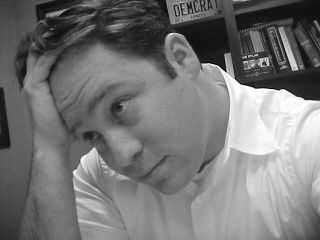Ariana Huffington gives a clever view of just how Karl Rove learned about Valerie Plame and why Judy Miller is willing to go to jail to "protect" a source that seemed determined to give her bogus information.
I’m struck by the special access and relationships she enjoyed with many of the key players in the Iraq debacle (which, at the end of the day, is really what Plamegate is all about).
For starters, of course, we have her still unfolding involvement in the Plame leak. Earlier this month, Howard Kurtz reported that Miller and Libby spoke a few days before Novak outed Plame -- and I’m hearing that the Libby/Miller conversation occurred over breakfast in Washington. Did Valerie Plame come up -- and, if so, who brought her up? There is no question that Miller was angry at Joe Wilson… and continues to be. A social acquaintance of Miller told me that, once, when she spoke of Wilson, it was with “a passionate and heated disgust that went beyond the political and included an irrelevant bit of deeply personal innuendo about him, her mouth twisting in hatred.”
Miller’s special relationships go much further than Scooter Libby, Richard Perle and the rest of the neocon establishment. Take her involvement as an embedded reporter during the war with the Pentagon’s Mobile Exploitation Team (MET) Alpha -- the unit charged with hunting down Saddam’s WMD. As extensively reported by both Kurtz and New York Magazine’s Franklin Foer, Miller’s time with the unit was highly unusual.
First, there was the fact that she landed the plumb assignment in the first place. It would give her first dibs on the biggest story of the war… the hoped-for reveal of Saddam’s much-touted WMD (with much of the touting done by Miller herself and her special sources). Was this the reward for her pro-administration prewar reporting?
Foer cites military and New York Times sources as saying that Miller’s assignment was so sensitive that Don Rumsfeld himself signed off on it. Once embedded, Miller acted as much more than a reporter. Kurtz quotes one military officer as saying that the MET Alpha unit became a “Judith Miller team.” Another officer said that Miller “came in with a plan. She was leading them… She ended up almost hijacking the mission.” A third officer, a senior staffer of the 75th Exploitation Task Force, of which MET Alpha was a part, put it this way: “It’s impossible to exaggerate the impact she had on the mission of this unit, and not for the better.”
What did Miller do to create such an impression? According to Kurtz, she wasn’t afraid to throw her weight around, threatening to write critical stories and complain to her friends in very high places if things didn’t go her way. “Judith,” said an Army officer, “was always issuing threats of either going to the New York Times or to the secretary of defense. There was nothing veiled about that threat.”
In one specific instance, she used her friendship with Major General David Petraeus to force a lower ranking officer to reverse an order she was unhappy about. (Can we stop for a moment and take the full measure of how unbelievable this whole thing is?)
Miller also had a special, ten-year relationship with Ahmed Chalabi, which led to the MET Alpha unit, which had no special training in interrogation or intelligence, being given custody of Saddam Hussein’s son-in-law, Sultan. Miller was even allowed to sit in on the initial questioning of Sultan -- a turn of events that didn’t go down well with some Pentagon officials.
Miller apparently ended up developing an especially close relationship with Chief Warrant Officer Richard Gonzalez, the leader of the MET Alpha unit. Along with puffing him up in some of her dispatches -- once describing his “meeting tonight with Mr. Chalabi to discuss nonproliferation issues” -- Miller took the unusual step of taking part in the ceremony where Gonzalez was promoted, actually pinning his new rank to his uniform (has the bizarreness of all this hit you yet?).
Later, when Miller’s reporting came under serious fire, Gonzalez was only too happy to return the favor, writing an impassioned response to the Times’ Iraq reporting mea culpa. “We have been deeply disturbed,” Gonzalez wrote in a letter to the Times that was co-signed by a pair of his colleagues, “by the mischaracterizations of the operation and of [Miller’s] reporting… We were particularly disturbed by the recent New York Times editor’s note apologizing for having been ‘taken in’ by WMD ‘misinformation’ and citing one article she wrote while embedded with our unit… We strongly disagree with that assertion and remain firmly supportive of the accuracy of her accounts of the events she described, as well as other articles she wrote while embedded with our unit.” Wow. I’m kinda surprised he didn’t sign it “JM + MET Alpha, N.A.F (Now and Forever)”.
But Gonzalez and his pals seem to be the only ones standing behind the accuracy of Miller’s reporting. Even the administration is no longer barking up that tree, with top weapons hunter Charles Duelfer closing his investigation this spring saying that the search for WMD “has been exhausted” without finding any -- while at the same time dismissing the Miller-touted claim that WMD had been shipped to Syria just before the U.S. invaded.
So the WMD investigation has ended. But the investigation into Judy Miller’s role -- both in the WMD fiasco and the Plame scandal -- is just beginning.

No comments:
Post a Comment